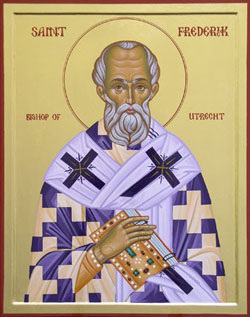
Frederick was trained in piety and sacred learning among the clergy of the Church of Utrecht. Being ordained priest, he was charged by Bishop Ricfried with the care of instructing converts, and about 825 he was chosen to succeed him as bishop of Utrecht. The new bishop at once began to establish order everywhere, and sent St. Odulf and other zealous and virtuous labourers into the northern parts to dispel the paganism which still subsisted there.
According to tradition St. Frederick became involved in the difficulties between the sons of the emperor, Louis the Debonair, and their father and step-mother. During these disturbances the party of the young princes charged the Empress Judith with numerous immoralities. Whatever may have been the truth of these stories, St. Frederick is said to have admonished her of them, with charity but with the effect of drawing upon himself the fury and resentment of the empress. He also got himself disliked elsewhere. The inhabitants of Walcheren were barbarous and most averse from the Gospel.
The story goes on that, on July 18, 838, after St. Frederick had celebrated Mass and was about to make his thanksgiving, he was stabbed by two assassins. He died in a few minutes, reciting that verse of Psalm 144, "I will praise the Lord in the land of the living". The eleventh century author of his life says that these assassins were employed by the Empress Judith, who could not pardon the liberty he had taken to reprove her sins, and was incited thereto by her husband. William of Malmesbury and others repeat the same; but later writers, such as Baronius and Mabillon, think that they were rather sent by some of the inhabitants of Walcheren. And this seems the more likely opinion: for no contemporary makes the charge against Judith and it is not at all in consonance with the attitude of Louis towards episcopal authority and Christian conduct. St.
Frederick composed a prayer to the Blessed Trinity which for many ages was used in the Netherlands. The reputation of his sanctity appears from a poem of Rabanus Maurus, his contemporary, in praise of his virtues.
Shortly after his death, Frederick was canonized. His feast day is 18 July and he is the patron saint of the deaf. He was buried in St. Salvator's Church in Utrecht.




